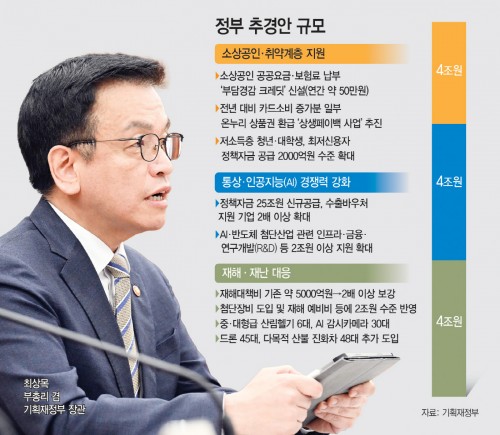 |
The South Korean government has increased its proposed extra budget to 12 trillion won—2 trillion won more than initially planned—to support economic stability and household livelihoods. However, passage through the National Assembly is expected to be challenging.
Since the start of the year, voices within the political sphere have called for a large-scale supplementary budget exceeding 30 trillion won to revitalize domestic demand. Given those expectations, it remains uncertain whether the revised budget will gain legislative approval.
According to political sources on April 15, the Ministry of Economy and Finance’s decision to raise the budget size reflects concerns over mounting domestic and global risks, including the impact of U.S. tariff policy and sluggish domestic demand.
Global investment banks like JPMorgan have already downgraded South Korea’s 2024 growth forecast from 1.2% to 0.7%, signaling growing economic concerns.
Despite the government’s revision, the Democratic Party swiftly responded with criticism. Party spokesperson Noh Jong-myon said, “The budget should be at least 15 trillion won,” urging a more expansive and proactive approach during the upcoming legislative review.
Given the Democratic Party’s stance and its intention to push for amendments once the bill reaches the National Assembly, some fear the extra budget plan may ultimately be rejected or heavily revised. Earlier this year, the party proposed its own supplementary budget totaling 35 trillion won, setting 15 trillion won as a minimum threshold for negotiations.
Meanwhile, the government continues to express concern about fiscal discipline. As of the end of February, the managed fiscal balance showed a deficit of 17.9 trillion won, meaning the government’s expenditures are outpacing revenues. Additional spending from the extra budget is likely to deepen the deficit.
Nevertheless, with a snap presidential election approaching, calls for a “super supplementary budget” are growing louder.
The newly proposed 12 trillion won budget targets urgent sectors such as wildfire response, strategic industries like AI and semiconductors, and support for small business owners. While this shift signals a more active fiscal stance compared to last year, officials maintain that funding will be focused on areas of immediate need.
Notably, the government introduced a new “coexistence payback” program, which will reimburse a portion of increased card spending to small business owners with annual revenue under 3 billion won, in the form of Onnuri gift certificates. It also plans to expand policy funds for low-income youth and individuals with the lowest credit ratings by 200 billion won.
To bolster Korea’s global competitiveness in semiconductors, the government unveiled a separate investment package raising total semiconductor-related spending from 26 trillion to 33 trillion won. An additional 2 trillion won will be allocated for disaster preparedness, including advanced equipment and contingency reserves for wildfires and summer typhoons.
Finance Minister and Deputy Prime Minister Choi Sang-mok said during a parliamentary session that he hopes the extra budget bill will pass between late April and early May. When asked whether 12 trillion won is sufficient to address the ongoing economic crisis, he replied, “The proposal includes the most urgent items that can pass quickly,” and declined to comment on the possibility of a second supplementary budget.
Most Read
-
1
-
2
-
3
-
4
-
5
-
6
-
7





















